For many individuals who have lost a limb due to an accident, the journey toward recovery includes not just medical treatment but also the challenge of affording a prosthetic limb. While prosthetic devices can restore mobility and independence, they can also be expensive, leaving many to wonder whether government-backed insurance schemes can help ease the financial burden.
One such scheme is the Pradhan Mantri Suraksha Bima Yojana (PMSBY), a low-cost accident insurance policy introduced by the Government of India to provide financial protection against accidental death and disability. Since it specifically covers accidents, many people assume that it might also help with the cost of prosthetic limbs. But how much support does it really provide?
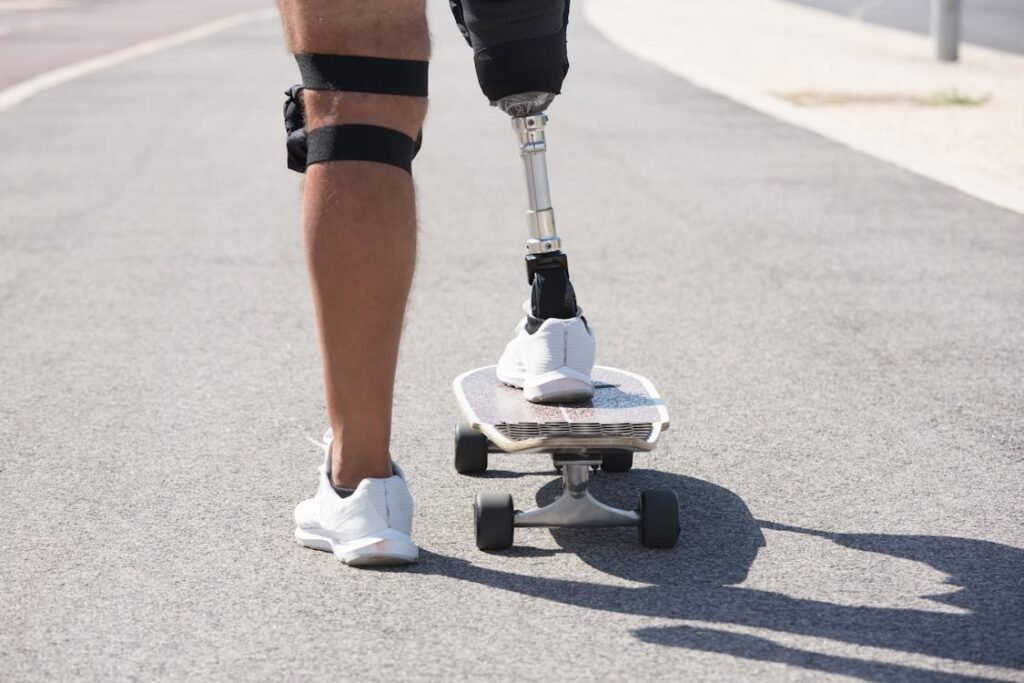
Understanding the Pradhan Mantri Suraksha Bima Yojana (PMSBY)
The Pradhan Mantri Suraksha Bima Yojana (PMSBY) is a government-backed accident insurance scheme designed to provide financial protection to individuals in case of accidental death or disability.
Launched in 2015, it is one of the most affordable insurance plans available in India, making it accessible to people from all economic backgrounds, especially those in the unorganized sector.
The primary purpose of PMSBY is to offer financial relief in case of an accident-related disability or death. For a minimal annual premium, policyholders are covered for a sum insured of ₹2 lakh in case of accidental death or total disability, and ₹1 lakh for partial disability.
Since prosthetic limbs are often needed due to accidents, many people wonder whether PMSBY can help cover the cost of a prosthetic device.
The scheme is available to all Indian citizens aged 18 to 70 years who have an active bank account.
The premium amount is automatically debited from the policyholder’s account once a year, ensuring that individuals remain covered without needing to manually renew their policy.
Unlike private insurance policies that come with complex terms, PMSBY is designed to be simple and easy to access, making it one of the most widely subscribed accident insurance schemes in the country.
Does PMSBY Cover Prosthetic Limb Costs?
While PMSBY provides financial compensation in cases of accidental disability, it does not directly cover medical expenses, hospital treatment, or the cost of prosthetic limbs.
This means that if an individual loses a limb in an accident, the scheme will provide a lump sum payout based on the type of disability, but it will not pay for the actual prosthetic device or related medical expenses.
If the policyholder suffers total disability, such as the complete loss of both hands, both feet, or a combination of limbs and eyesight, they are eligible for a ₹2 lakh payout.
In the case of partial disability, such as losing one hand, one foot, or vision in one eye, the payout is ₹1 lakh. This amount is provided as direct financial assistance, which the beneficiary can use for medical treatment, rehabilitation, or purchasing a prosthetic limb.
Since the scheme does not operate on a reimbursement basis, individuals who need a prosthetic limb will have to use the payout amount themselves rather than expecting the insurance provider to pay the prosthetic manufacturer directly.
The biggest challenge here is that the cost of high-quality prosthetic limbs, especially advanced bionic options like Grippy™ by Robobionics, may exceed the payout amount, requiring individuals to find additional funding sources to cover the remaining cost.
The Limitations of PMSBY for Prosthetic Users
One of the biggest drawbacks of PMSBY is that it does not cover ongoing medical expenses or rehabilitation.
While the lump sum payout is helpful, it may not be sufficient to cover the full costs associated with limb loss, including hospital bills, surgery, physiotherapy, and prosthetic fittings.
Another limitation is that PMSBY only applies to accident-related disabilities. If an individual loses a limb due to diabetes, vascular disease, or a congenital condition, they will not be eligible for any payout under the scheme.
This means that people who need prosthetic limbs due to medical conditions rather than accidents will have to explore alternative funding options.
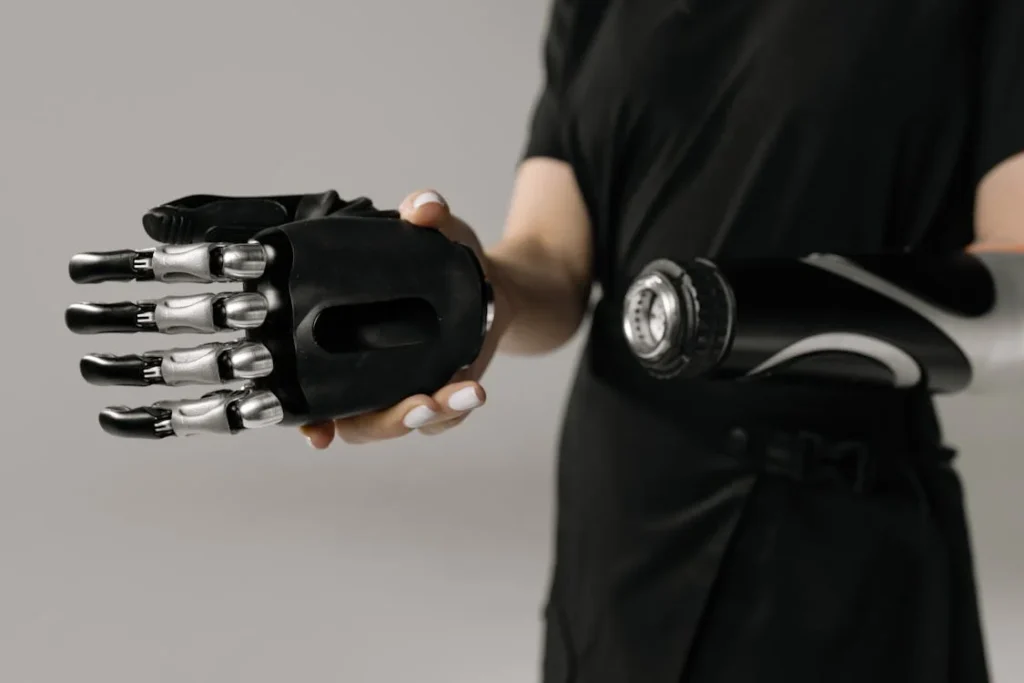
How to Claim PMSBY Benefits for Prosthetic Limb Expenses
Since Pradhan Mantri Suraksha Bima Yojana (PMSBY) does not directly cover prosthetic limb costs, individuals who have suffered an accident-related disability must follow the correct claim process to receive their financial payout.
This payout can then be used to cover prosthetic expenses, rehabilitation, and other medical needs.
Filing a Claim Under PMSBY
The first step in claiming PMSBY benefits is to ensure that the policyholder or their family reports the accident as soon as possible. The claim must be filed within 30 days of the accident, and a delay in submitting the claim may lead to rejection or complications.
The policyholder should visit their bank branch (where the policy is registered) to obtain a claim form and understand the necessary documentation required.
A medical certificate or disability certificate from a government-approved hospital is required to confirm the nature of the disability. This certificate must clearly state whether the disability is total (resulting in a ₹2 lakh payout) or partial (resulting in a ₹1 lakh payout).
If the disability certificate does not provide sufficient details, the insurance provider may request additional medical records, such as hospital discharge summaries, surgical reports, or X-rays.
Along with medical documentation, the policyholder must provide a copy of their Aadhaar card, bank account details, and PMSBY policy information.
If the claim is being filed by a nominee (in case of accidental death), additional documents such as a death certificate and proof of relationship with the deceased policyholder will be required.
Once all required documents are submitted to the bank, the insurance provider processes the claim. If the claim is approved, the payout is transferred directly to the policyholder’s bank account, usually within 30 to 60 days.
If the claim is denied, the policyholder has the right to appeal and provide further supporting documents.
Using PMSBY Payouts to Cover Prosthetic Limb Costs
Since the PMSBY payout is not linked to specific medical expenses, the beneficiary has full control over how the funds are used.
This means that individuals who need prosthetic limbs can allocate the money towards purchasing a prosthetic device, undergoing rehabilitation therapy, or covering travel expenses to a specialized prosthetic clinic.
For those considering advanced bionic prosthetic solutions, the ₹1 lakh to ₹2 lakh payout may only cover a portion of the total cost.
In such cases, individuals may need to combine PMSBY benefits with additional funding sources such as government disability schemes, employer-sponsored insurance, or NGO assistance to afford a high-quality prosthetic limb.
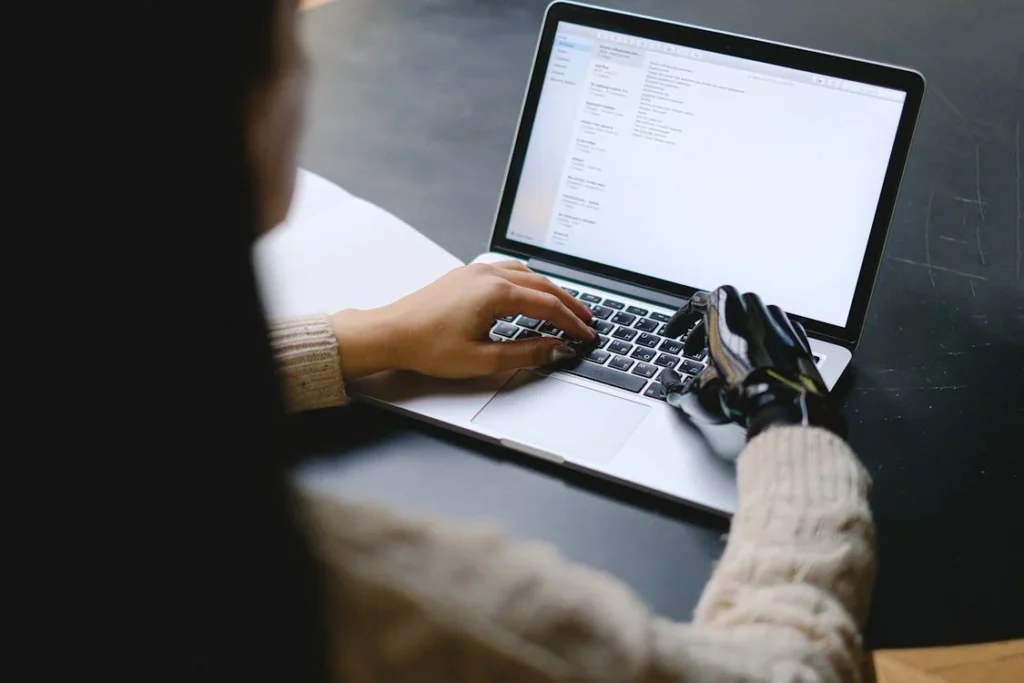
Alternative Funding Options for Prosthetic Limb Costs
While the Pradhan Mantri Suraksha Bima Yojana (PMSBY) provides a financial payout for accident-related disabilities, the amount may not always be enough to cover the full cost of a prosthetic limb.
Many individuals need to explore additional funding options to ensure they receive the best possible prosthetic device for their needs. Fortunately, government schemes, NGOs, and corporate assistance programs can help bridge the gap.
Government Disability Schemes and Subsidies
Apart from PMSBY, the Government of India runs several programs to support individuals with disabilities, including those who require prosthetic limbs.
The Assistance to Disabled Persons for Purchase/Fitting of Aids and Appliances (ADIP) Scheme) provides financial assistance to people with disabilities from low-income backgrounds.
Under this scheme, eligible individuals can receive prosthetic limbs either free of cost or at a highly subsidized rate.
To apply for ADIP scheme benefits, individuals need to visit an authorized prosthetic rehabilitation center or government hospital that distributes assistive devices under the program.
A disability certificate and income proof are required to qualify. Some states also run their own disability assistance programs, which provide additional subsidies for prosthetic limbs and rehabilitation services.
In addition, government health schemes like Ayushman Bharat Pradhan Mantri Jan Arogya Yojana (PMJAY) offer free treatment and post-surgical rehabilitation support.
While PMJAY does not specifically list prosthetic limbs as a covered benefit, some hospitals and rehabilitation centers under the scheme may provide partial assistance for prosthetic fittings.
NGO Assistance for Free or Low-Cost Prosthetic Limbs
Many non-governmental organizations (NGOs) in India provide free or affordable prosthetic limbs to individuals who cannot afford them.
Organizations like Jaipur Foot (BMVSS), Narayan Seva Sansthan, and Bharat Vikas Parishad run prosthetic donation camps across India, ensuring that people from all financial backgrounds can access artificial limbs.
Jaipur Foot, for example, is known for its low-cost, high-quality prosthetic limbs that are custom-made to suit different types of limb loss. Many beneficiaries have received fully functional prosthetic limbs free of cost, allowing them to regain mobility without financial burden.
Individuals looking for prosthetic limb assistance through NGOs can visit their nearest rehabilitation center or check online for upcoming limb donation camps.
These organizations often partner with hospitals, corporate donors, and government initiatives to ensure that prosthetic solutions are available to those in need.
Employer-Sponsored Health Insurance and CSR Programs
For individuals who are employed, corporate health insurance policies sometimes provide better prosthetic limb coverage than government schemes.
Many large corporations and multinational companies offer group health insurance that covers medical rehabilitation, durable medical equipment, and post-surgical recovery, which may include prosthetic limbs.
If an individual loses a limb due to a workplace accident, they may be eligible for workers’ compensation benefits, which can help cover medical expenses and prosthetic limb costs.
Employers who engage in Corporate Social Responsibility (CSR) programs may also sponsor prosthetic limbs for employees who need them.
For those working in government organizations, central and state government employee insurance plans sometimes provide additional financial support for assistive devices.
Checking with HR departments or insurance coordinators can help individuals understand what benefits are available to them.
Crowdfunding for Prosthetic Limb Expenses
When insurance claims and government assistance fall short, crowdfunding can be a powerful way to raise funds for a prosthetic limb.
Online platforms like Milaap, Ketto, and ImpactGuru allow individuals to share their stories and raise money from donors who want to help. Many people have successfully raised funds for high-quality bionic prosthetic limbs through crowdfunding campaigns.
Setting up a successful crowdfunding campaign involves creating a compelling story, sharing medical documentation, and reaching out to family, friends, and the wider community for support.
Social media plays a crucial role in amplifying the campaign, helping people connect with donors willing to contribute to the cause.
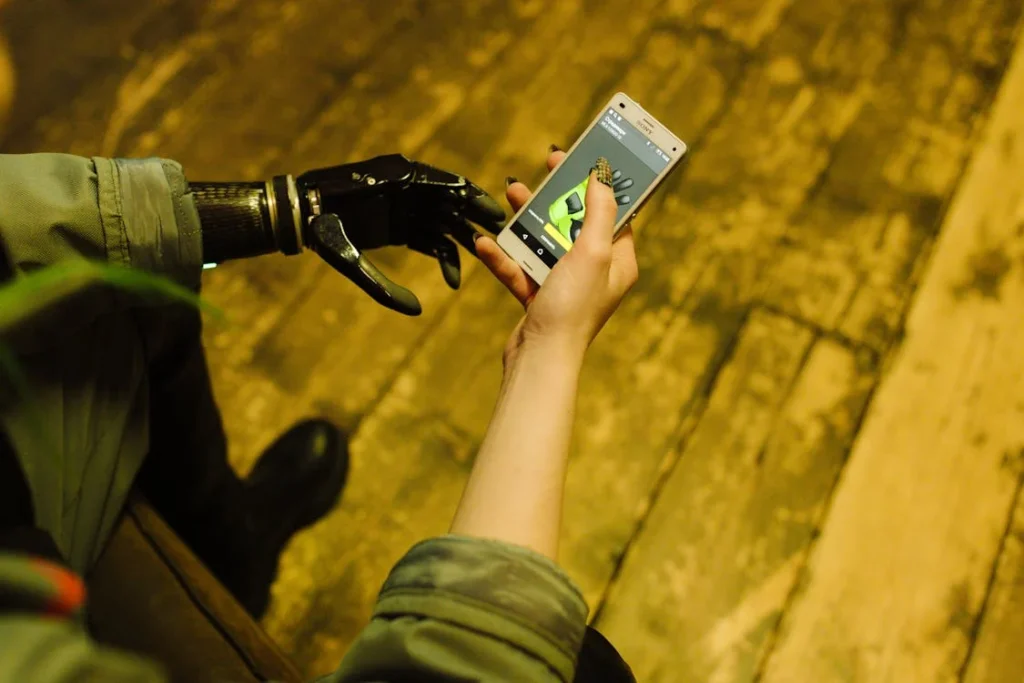
Maximizing Financial Support for Prosthetic Limb Costs
Since the Pradhan Mantri Suraksha Bima Yojana (PMSBY) provides only a lump sum payout, individuals seeking a prosthetic limb need to be strategic about how they utilize these funds and explore additional financial support.
Proper planning can ensure that they get a high-quality prosthetic device without unnecessary financial stress.
Combining Multiple Funding Sources
One of the best ways to afford a prosthetic limb is by combining insurance payouts, government aid, NGO assistance, and employer support.
The PMSBY payout can serve as initial financial assistance, but when combined with subsidies from the ADIP scheme, contributions from NGOs, and employer-sponsored benefits, it becomes easier to afford a durable and well-fitted prosthetic limb.
Those who require a more advanced prosthetic device, such as a bionic limb with grip control and enhanced functionality, can also use crowdfunding platforms to raise the additional amount required.
Many successful cases have shown that by sharing personal stories and reaching out to social media communities, local businesses, and charitable organizations, individuals can secure enough funds to get a state-of-the-art prosthetic limb.
Choosing a Cost-Effective Yet High-Quality Prosthetic Limb
While high-end bionic limbs offer the best in terms of movement and usability, affordable yet durable prosthetic solutions are available that provide excellent functionality at a lower cost.
Prosthetic manufacturers like Robobionics offer innovative, ergonomic, and lightweight solutions at a fraction of the cost of imported prosthetic limbs.
Individuals should research different prosthetic options and consult with certified prosthetists and rehabilitation experts before making a purchase.
Factors like durability, ease of maintenance, and comfort should be considered alongside cost. By choosing a locally manufactured, high-quality prosthetic limb, individuals can ensure better after-sales service, faster repairs, and more affordable replacements when needed.
Seeking Guidance from Prosthetic Experts
Navigating the process of insurance claims, government funding, and choosing the right prosthetic limb can be overwhelming, especially for individuals who are new to this experience.
Seeking guidance from prosthetic specialists, physiotherapists, and insurance advisors can make a huge difference in getting the best financial support and selecting the right prosthetic limb for long-term use.
Organizations like Robobionics not only provide high-quality prosthetic limbs but also assist individuals in understanding their insurance options, applying for funding assistance, and connecting with support groups.
Consulting with experts ensures that every step of the prosthetic limb journey is well-informed and stress-free.
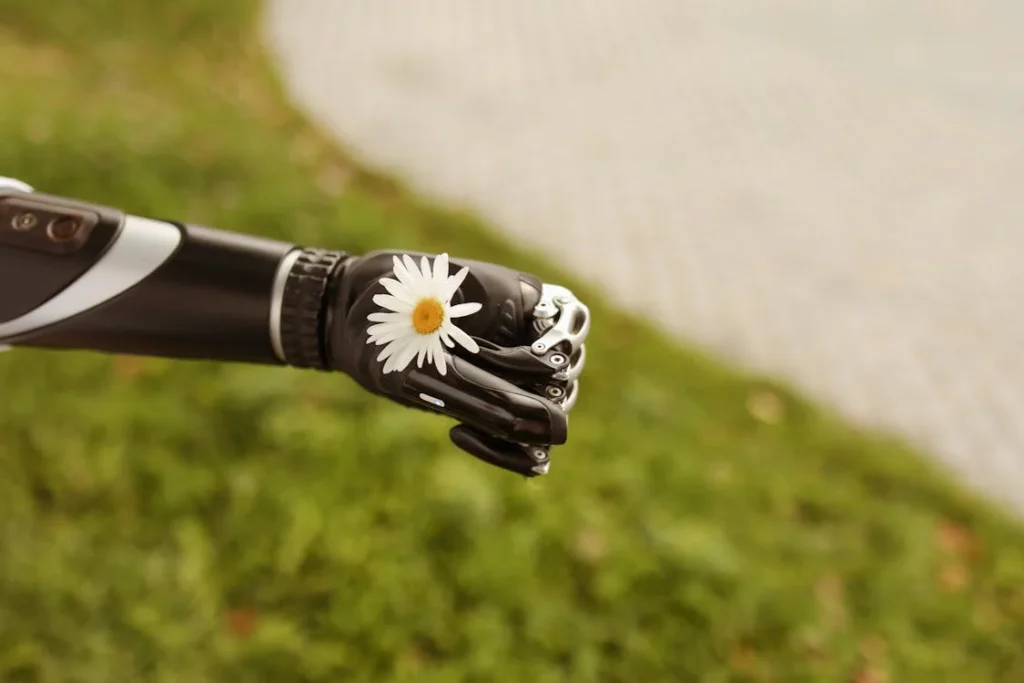
The Psychological and Social Impact of Prosthetic Limbs
While financial concerns are a major barrier to accessing prosthetic limbs, the emotional and social challenges that come with limb loss are just as significant.
Losing a limb is not just a physical transformation—it deeply affects a person’s self-esteem, confidence, and social interactions.
Many individuals experience isolation, depression, and anxiety after amputation, making the role of prosthetic limbs even more critical in their rehabilitation journey.
Restoring Confidence and Independence
A well-fitted prosthetic limb is more than just a medical device—it is a tool that helps individuals regain control over their lives. The ability to walk again, hold objects, or perform daily tasks independently brings a sense of normalcy that can greatly improve mental health.
Many prosthetic users report feeling more socially accepted and confident after receiving their device, as it allows them to engage in everyday activities without relying on others.
For individuals who were previously employed, a prosthetic limb can be the key to returning to work, supporting their families, and rebuilding their careers.
This is particularly important for those working in physically demanding jobs, such as laborers, drivers, and factory workers, where mobility is essential.
Breaking the Stigma Around Disability
In many parts of India, social stigma around disability is a major issue. People with limb loss are often viewed differently or assumed to be incapable of leading a normal life. This leads to discrimination in workplaces, communities, and even within families.
Prosthetic limbs play a crucial role in challenging these perceptions by proving that individuals with limb loss can be just as capable as anyone else.
Many athletes, artists, professionals, and entrepreneurs with prosthetic limbs have shattered stereotypes and become role models, inspiring others to overcome their physical challenges.
NGOs and prosthetic manufacturers like Robobionics are actively working to promote awareness and change societal attitudes toward prosthetic users.
Through education, media representation, and support programs, these initiatives are helping to create a more inclusive society where disability is not seen as a limitation.
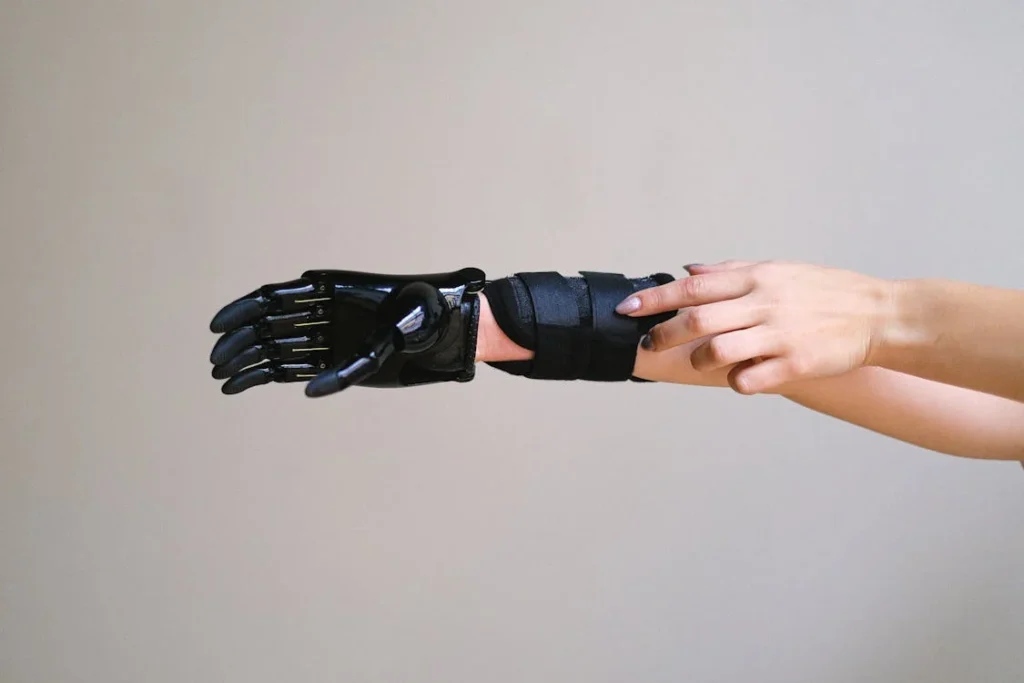
The Need for Better Rehabilitation Services in India
While financial assistance for prosthetic limbs is improving, access to proper rehabilitation services remains a challenge in India.
Many individuals who receive a prosthetic limb struggle to adapt to using it effectively due to the lack of trained physiotherapists, rehabilitation centers, and post-prosthetic support programs.
The Importance of Rehabilitation in Prosthetic Success
Using a prosthetic limb requires training and practice. Simple tasks like walking, gripping objects, maintaining balance, and climbing stairs need to be relearned.
Without proper gait training and physiotherapy, many individuals find their prosthetic limb uncomfortable or difficult to use, leading them to abandon it altogether.
In developed countries, rehabilitation is an essential part of prosthetic limb fitting, with users undergoing months of guided training to ensure a smooth transition.
However, in India, many patients receive little to no follow-up support, especially in rural areas where rehabilitation centers are scarce.
How India Can Improve Prosthetic Rehabilitation
To improve outcomes for prosthetic users, India needs a stronger network of rehabilitation centers, better-trained physiotherapists, and wider access to post-prosthetic support services.
More hospitals should integrate prosthetic rehabilitation into their treatment plans, ensuring that every patient receives guidance on how to use their limb effectively.
Some organizations have started home-based prosthetic training programs, allowing individuals in remote areas to receive virtual guidance and customized therapy plans.
Advances in AI-driven rehabilitation tools and gamified prosthetic training apps are also helping users adapt to their new limbs more easily.
Companies like Robobionics are at the forefront of these innovations, ensuring that users receive ongoing support, personalized fitting services, and adaptive rehabilitation techniques to maximize the benefits of their prosthetic limb.
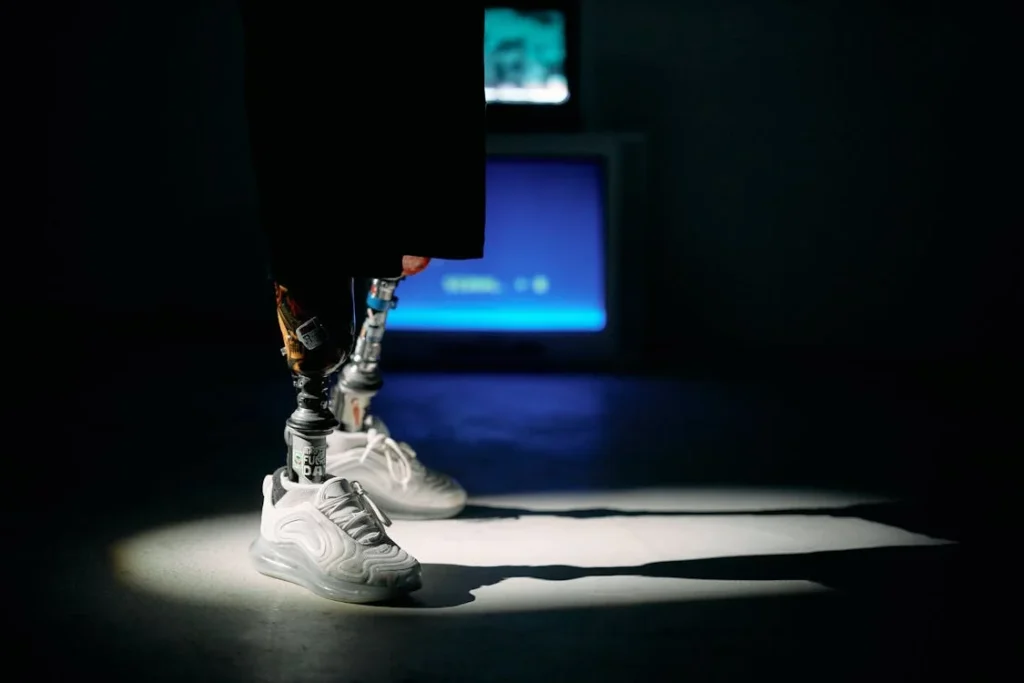
The Future of Prosthetic Limb Accessibility in India
While progress has been made in making prosthetic limbs more affordable and accessible, there is still a long way to go before every individual who needs a prosthetic can get one without financial barriers.
With advancements in technology, insurance policies, and public awareness, the future of prosthetic limb accessibility in India looks promising.
Technological Advancements in Prosthetic Manufacturing
Prosthetic technology has evolved significantly over the years. Earlier, heavy and rigid prosthetic limbs limited mobility and comfort. Today, lighter, more flexible, and highly functional prosthetic limbs are available, allowing users to perform complex movements with ease.
The rise of 3D printing technology has played a major role in reducing the cost of prosthetic limbs while maintaining high quality.
3D-printed prosthetics are customized based on the user’s exact limb measurements, ensuring a perfect fit at a fraction of the cost of traditional prosthetics.
Companies like Robobionics are using these innovations to create affordable, ergonomic, and lightweight prosthetic limbs, making advanced solutions available to a larger population.
As research continues, the integration of AI-powered smart prosthetics could further revolutionize the field, offering better control, sensory feedback, and adaptability.
Expanding Insurance Coverage for Prosthetic Devices
One of the biggest obstacles to prosthetic accessibility in India is limited insurance coverage. While PMSBY and other government schemes provide some financial assistance, there is no universal health policy that fully covers the cost of prosthetic limbs.
Future policy changes should focus on:
- Expanding health insurance to fully cover prosthetic devices and rehabilitation
- Introducing government subsidies for advanced prosthetic solutions
- Partnering with private insurance providers to offer better prosthetic coverage options
If prosthetic limb coverage becomes a standard part of health insurance policies, more individuals will be able to access high-quality prosthetics without facing financial hardship.
Building a More Inclusive Society for Prosthetic Users
Accessibility is not just about making prosthetic limbs available—it’s about ensuring that individuals with prosthetic limbs can fully participate in society, education, employment, and public spaces without barriers.
Many countries have strict disability inclusion laws that require businesses, schools, and public spaces to be fully accessible for individuals with mobility challenges. India is slowly moving in this direction, but more efforts are needed to create a truly inclusive society.
Public transportation, workplaces, and recreational facilities should be designed to accommodate prosthetic users, ensuring that they can move freely and comfortably.
Awareness campaigns, education programs, and employment opportunities should also be promoted to empower prosthetic users and eliminate stigma.
Conclusion
The Pradhan Mantri Suraksha Bima Yojana (PMSBY) provides crucial financial support for individuals who suffer accidental disabilities, but it does not directly cover prosthetic limb costs. Instead, it offers a lump sum payout, which can be used for medical treatment, rehabilitation, or purchasing a prosthetic limb. However, for those seeking high-quality prosthetics, the PMSBY payout alone may not be enough, making it necessary to explore government subsidies, NGO support, crowdfunding, and employer-sponsored benefits.
The future of prosthetic limb accessibility in India depends on technological advancements, improved insurance policies, and stronger rehabilitation programs. As awareness grows, there is hope that more comprehensive insurance coverage and financial assistance programs will make prosthetic limbs more affordable for everyone in need.
At Robobionics, we are committed to providing affordable, high-quality prosthetic limbs while helping individuals navigate insurance claims, funding options, and rehabilitation support. If you or a loved one needs a prosthetic limb and wants guidance on how to maximize financial assistance, reach out to us today. Let’s take the next step toward mobility, independence, and a better quality of life together.



